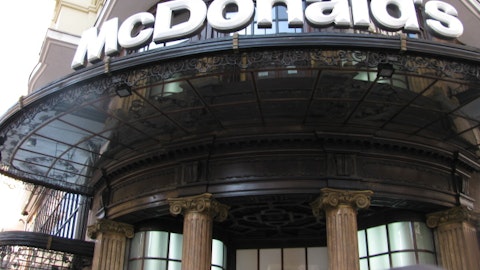McDonald’s Corporation (NYSE:MCD) has more than 35,000 locations in over 100 countries. In Europe, North America, and increasingly Asia, McDonald’s is very easy to find. The company’s ‘Golden Arches’ are recognized throughout the world.
The company’s massive size relative to its peers allows it to buy commodity food products from suppliers at the lowest possible price. McDonald’s has historically offered extremely affordable “value menu” and “dollar menu” offerings.
McDonald’s has managed to grow to over 36,000 locations by pioneering the franchise business model. Only about 20% of McDonald’s locations are company operated. The remaining 80% are operated by entrepreneurs who pay to use the McDonald name and products. Franchising minimizes the cost of opening a store for McDonald’s and spreads risk to the franchise owner rather than McDonald’s corporation. It results in a highly capital efficient business that is easy to scale.
Growth Prospects
McDonald’s has the potential to realize solid growth for shareholders. The company is committed to becoming more capital efficient by increasing its franchised store count from 81% to 90%.
The company is also slowly focusing on healthier/more natural ingredients and a more streamlined menu in efforts to better serve customers.
If things go well for McDonald’s, the company’s expected total returns will come from the following sources:
- 3.0% from dividends
- 3.0% from store count growth
- 3.0% from comparable store sales increases
- 1.5% from share repurchases
- 1.0% from margin improvements
This would result in total returns of around 11.5% a year. This is the bull case for McDonald’s – if the company continues solid results from its most recent quarter.
If comparable store sales stagnate (or even decline) as they did in 2013 and 2014, McDonald’s shareholders should expect total returns of 7% to 8.5% a year from the same sources above (and accounting for flat or negative comparable store sales growth).
When one examines the bull and bear case for the company, one realizes how consistent McDonald’s is. The company can continue to build out stores, pay dividends, and repurchase shares to generate solid returns for shareholders. In addition, margins should rise as the company switches more stores to being franchises.
Recession Performance
From 2007 through 2009, McDonald’s stock generated total returns of 55.9% for shareholders, while the S&P 500 had total returns of negative 15.9%.
McDonald’s is the most recession-resistant Dividend Aristocrat. The company’s performance over the Great Recession of 2007 to 2009 is nothing short of remarkable. The company’s earnings-per-share growth through the Great Recession is shown below to illustrate this point:
- 2007 earnings-per-share of $2.91
- 2008 earnings-per-share of $3.67
- 2009 earnings-per-share of $3.98
McDonald’s performs well through recessions because it is known to sell cheap food. Consumers become more cost-conscious during recessions and substitute higher priced dining experiences for lower priced options like McDonald’s.
Final Thoughts
McDonald’s Corporation (NYSE:MCD) is a high quality business with a strong and durable competitive advantage. The company tends to tread water when management doesn’t focus on the company’s value proposition of cheap food fast – from a clean store. When management is on point, however, McDonald’s share holders tend to see solid gains.
The company is currently trading for an adjusted price-to-earnings ratio of 23.3. This is well above the company’s historical average price-to-earnings ratio over the last decade of 16.6.
At current prices, McDonald’s is likely trading above fair value. Potential investors looking to initiate a position in McDonald’s should wait till the company’s stock price falls somewhat before buying new shares.
As a high quality company with an above average dividend yield of 3% and solid expected total return potential, McDonald’s is a hold for long-term investors using The 8 Rules of Dividend Investing.
Disclosure: None





